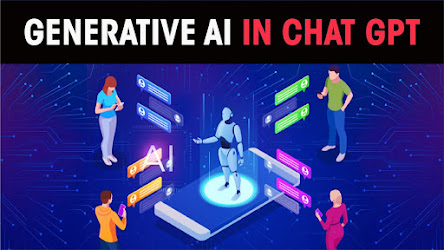Generative AI is slowly and gradually taking over the world with its technology of interacting with machines and processing information. This cutting-edge technology allows machines to generate human-like content and revolutionizes various industries by enhancing user experiences.
This article will delve into the evolving landscape of Generative AI and explore the groundbreaking applications of one of its most promising tools: ChatGPT.
The Rise of Generative AI: A Transformative Journey
Generative AI, a subset of artificial intelligence, focuses on teaching machines to generate data that is indistinguishable from human-created content. This technology has found applications in a multitude of fields, from creative arts and content creation to customer service and education.
In recent years, Generative AI has witnessed a surge in popularity due to advancements in deep learning techniques, particularly with models like OpenAI's GPT (Generative Pre-trained Transformer) series. These models, trained on vast datasets, have the ability to generate coherent and contextually relevant text, making them invaluable assets in a world increasingly reliant on digital communication.
The Power of ChatGPT: Enhancing Human-Machine Interactions
Among the pioneering Generative AI models, ChatGPT, developed by OpenAI, has emerged as a frontrunner. ChatGPT utilizes deep learning algorithms to understand context, generate human-like responses, and engage in meaningful conversations. Its applications are diverse, ranging from customer support and virtual assistants to content creation and educational tools.
· Revolutionizing Customer Support: ChatGPT has transformed customer service by providing instant, efficient, and personalized responses. Businesses can integrate ChatGPT into their websites, addressing customer queries and concerns around the clock and enhancing user satisfaction and loyalty.
· Enabling Interactive Learning: In the realm of education, ChatGPT serves as an interactive learning companion. It can provide real-time explanations, answer questions, and assist students with their studies, thereby enhancing the learning experience and catering to individual needs.
· Content Creation and Ideation: Content creators and writers are leveraging ChatGPT to overcome writer's block, generate creative ideas, and draft high-quality articles. It acts as a collaborative tool, enhancing the creative process and inspiring new perspectives.
· Enhancing Language Translation: ChatGPT's proficiency in understanding context makes it a valuable asset in language translation. It can translate complex sentences and idiomatic expressions, bridging language barriers and fostering global communication.
Challenges and Ethical Considerations
While the advancements in Generative AI, especially with models like ChatGPT, are impressive, they also raise ethical concerns. The potential misuse of AI-generated content, the need for responsible AI use, and the importance of data privacy have become critical topics of discussion. As the technology evolves, it is imperative for developers, businesses, and policymakers to collaborate in establishing ethical guidelines and ensuring responsible AI deployment.
Looking Ahead: The Future of Generative AI and ChatGPT
As we peer into the future, the trajectory of Generative AI appears promising. Continued research and development are expected to refine existing models and introduce innovative applications. The integration of Generative AI into virtual reality, augmented reality, and gaming is anticipated to redefine immersive experiences, blurring the lines between the digital and physical worlds.
In the case of ChatGPT, its evolution will likely involve enhanced contextual understanding, improved multilingual capabilities, and increased personalization. With ongoing advancements, ChatGPT is poised to become an indispensable tool in various industries, fostering intelligent human-machine collaborations and transforming the way we communicate, learn, and create content.
Final Thoughts
The analysis of Generative AI trends and ChatGPT usage underscores the transformative power of these technologies. While challenges and ethical considerations persist, the potential for a positive impact on society, businesses, and education cannot be denied. As we navigate this AI-driven future, responsible development and conscientious application will be key in harnessing the full potential of Generative AI and ensuring a better, more connected world for all.
Visit www.onpassive.com for more tech-related updates.


